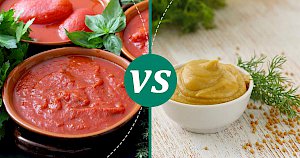Mustard vs Tomato Sauce: Health Insights
Where is more calories, protein, carbs - what is more healthy?


Tomato sauce vs Mustard: Nutrition Comparison
| per 100g | Mustard | Tomato sauce |
|---|---|---|
| Calories | 97 | 24 |
| Carbohydrates | 5.83 g | 5.31 g |
| Fat | 3.34 g | 0.3 g |
| Dietary fiber | 4 g | 1.5 g |
| Protein | 3.74 g | 1.2 g |
| Water | 83.72 g | 91.28 g |
| Calcium | 63 mg | 14 mg |
| Iron | 1.61 mg | 0.96 mg |
| Magnessium | 48 mg | 15 mg |
| Phosphorus | 1.4 mg | 2.8 mg |
| Potassium | 152 mg | 297 mg |
| Sodium | 1104 mg | 11 mg |
| Zink | 1.4 mg | 2.8 mg |
| Vitaminium B1 (Thiamine) | 0.177 mg | 0.024 mg |
| Vitaminium B2 (riboflavin) | 0.07 mg | 0.065 mg |
| Vitaminium B3 (Niacin) | 0.565 mg | 0.991 mg |
| Vitaminium B6 | 0.07 mg | 0.098 mg |
| Vitaminium B9 (Folic acid) | 0.007 mg | 0.009 mg |
| Vitaminium C | 0.3 mg | 7 mg |
| Vitaminium E | 0.36 mg | 1.44 mg |
| Vitaminium K | 0.001 mg | 0.003 mg |
More Calories in Mustard
At first glance, you can see that in mustard is much more calories than in tomato sauce.
Mustard has 97 kcal per 100g and tomato sauce 24 kcal per 100g so it is pretty easy to calculate that the difference is about 304%.
Additionally, it is also easy to notice that most of the calories in mustard cames from fat and in tomato sauce from carbs.
See tables below to compare mustard with tomato sauce in details.
Mustard And Tomato sauce Nutrition Difference
- Calories:
mustard - 304% more than tomato sauce - Carbohydrates:
mustard - 10% more than tomato sauce - Fat:
mustard - 1013% more than tomato sauce - Dietary fiber:
mustard - 167% more than tomato sauce - Protein:
mustard - 212% more than tomato sauce - Water:
tomato sauce - 9% more than mustard
More protein in mustard
It is aslo easy to see see that in mustard is more protein than in tomato sauce.
There is 1.2g per 100g of tomato sauce and 3.74g per 100g of mustard so using simple math we can see that difference is about 212%.
More carbohydrates in mustard
In mustard is more carbohydrates than in tomato sauce.
There is 5.31g/100g of carbohydrates in tomato sauce and 5.83g/100g in mustard so let me do the math for you again - difference is about 10%.
More fat in mustard
In mustard is more fats than in tomato sauce.
The tables above show us that there is 0.3g/100g of fats in tomato sauce and 3.34g/100g in mustard. In this case difference is about 1013%.
Mustard
97kcal- Calories97
- Carbohydrates5.83 g
- Fat3.34 g
- Dietary fiber4 g
- Protein3.74 g
- Water83.72 g
100g | ounce | tablespoon | teaspoon | cup | half cup | standard jar
Calories source
- 34% CARBS.
- 22% PROTEIN
- 44% FAT
Tomato sauce
24kcal- Calories24
- Carbohydrates5.31 g
- Fat0.3 g
- Dietary fiber1.5 g
- Protein1.2 g
- Water91.28 g
100g | ounce | tablespoon | teaspoon | cup | half cup
Calories source
- 74% CARBS
- 17% PROTEIN
- 9% FAT
Vitamins: tomato sauce vs mustard
- Vitaminium B1 (Thiamine):
mustard - 638% more than tomato sauce - Vitaminium B2 (riboflavin):
mustard - 8% more than tomato sauce - Vitaminium B3 (Niacin):
tomato sauce - 75% more than mustard - Vitaminium B6:
tomato sauce - 40% more than mustard - Vitaminium B9 (Folic acid):
tomato sauce - 29% more than mustard - Vitaminium C:
tomato sauce - 2233% more than mustard - Vitaminium E:
tomato sauce - 300% more than mustard - Vitaminium K:
tomato sauce - 200% more than mustard
Minerals: mustard vs tomato sauce
- Calcium:
mustard - 350% more than tomato sauce - Iron:
mustard - 68% more than tomato sauce - Magnessium:
mustard - 220% more than tomato sauce - Phosphorus:
tomato sauce - 100% more than mustard - Potassium:
tomato sauce - 95% more than mustard - Sodium:
mustard - 9936% more than tomato sauce - Zink:
tomato sauce - 100% more than mustard
Compares of mustard
- Mustard vs Celery
- Mustard vs Mayonnaise
- Mustard vs Ketchup
- Mustard vs Soy Sauce
- Mustard vs Tomato Sauce
- see all compares of mustard
Compares of tomato sauce
Read also:
- Calories from Mustard
- Calories of Pork sausage
- Calories in Coconut milk
- Squid calories per 100g
- Agave syrup carbs per 100g
- Zebra cakes protein per 100g
- Cucumber sushi roll fat per 100g
- How many calories does cutie clementine have?
- Calories in a half of kalamata olives
- Calories in whole kalamata olives
- Calories for one, two or more kalamata olives
- How much protein in Sun Chips?
Marcin Piotrowicz
calories-info.com creator
Healthy diet and healthy lifestyle promoter
Add comment